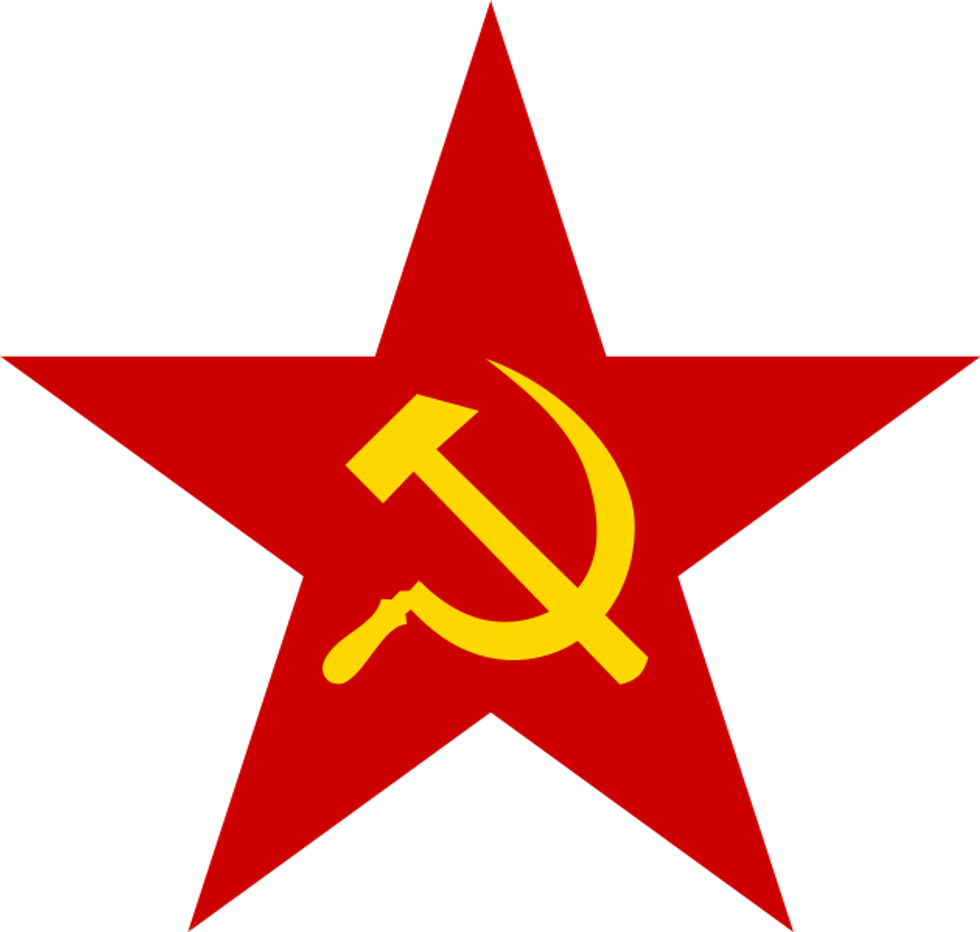Karl Marx’s The German Ideology and On the Jewish Question discusses Marx’s theory on economics and the influence Georg Hegel and Ludwig Feuerbach had on him. Hegel influenced Marx on the concepts historical materialism and alienation where Feuerbach influences him on alienation. Under The German Ideology, Marx discusses five economic systems which includes tribal, ancient, feudal, capitalist, and communism which has three stages itself. Pictured below is the communist symbol.
The red represents the blood of the workers who died in the struggle against capitalism, the hammer and sickle represents the hard work that industrial workers did and the tool that made work easier to harvest wheat, and the star represents the communist ideology.
To give a little background of Hegel and Feuerbach’s theory, Hegel believes history moves in terms. Hegel believes history moves in terms of science from the thesis to antithesis to the synthesis. The state which has the sense of community and then the civil society which creates the individuality of a person. As three examples to the three sections of history, Hegel uses the Greeks as the thesis where there is a sense of community but no individuality. The antithesis is the Romans where there is individuality, but no sense of community, and the synthesis as the modern state or Prussia where there is both a sense of individuality and sense of community. He formed the idea that history moved forward from economics and labor instead of ideas and people.
Feuerbach’s concept of alienation is to figuratively “kill God” and restore those good qualities and apply them to ourselves. Alienation has three forms which include being alienated from our products which lead to depression and revolt, alienation from our labor, and alienation from other people. Alienation from other people is when a person fakes the love of the work they do which lowers the competition and not wanting to work anymore. These three forms of alienation and historical materialism leads up to Karl Marx’s theory of economics.
Marx identifies five economic systems that concludes with communism as the final step for an economy. The first is tribal where there isn’t much division of labor because work is divided amongst the family. Following comes the ancient economy, private property starts to emerge and rural and urban starts to become antagonistic. Next a feudal economy develops where conflict increases, division of labor is developed, and economic classes are established. The fourth system is the capitalist economy in which humanity is becoming splintered to the extreme and labor is divided as far as it can be pushed.
In result, society leads into violent revolt to redistribute giving society a communistic economy. Communism at this point is put in three stages, crude, transitional, and mature. The crude stage is quoted by Marx to be, “Each man has a particular, exclusive sphere of activity, which is forced upon him and from which he cannot escape.” Crude is right before the revolt leading up to a communistic economy. Transitional is the transition from going to capitalism to communism. In communism, there is not a state or government. What drives politics is the economy itself. The last stage is mature where Marx describes it as, “Each can become accomplished in any branch he wishes, society regulates the general production and thus makes it possible for me to do one thing today and another tomorrow.” The last stage is where communism works and a person can work freely for the job that they got a degree for.
The five economic stages are what leads up to communism and the idea of freely doing what one wants with their degree. Marx was influenced by Hegel and Feuerbach’s concepts of alienation and historical materialism that lead to Marx’s economic theory. The more division of labor there is, the more alienation will occur. From observations of history, Marx’s theory of communism has not been truly tested in the stages listed. The forms of communism we know are through the countries China, Russia, and Cuba where the theory is actually not being truly practiced. I am not saying communism is a good thing, but to mainly bring awareness that the original theory created by Karl Marx has not been tested and probably never will be.


















